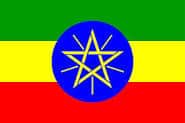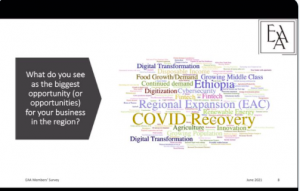Insights
The Eastern Africa Association is a source of insightful and helpful publications, guides, and advice for all visitors to our website. Contributors include EAA analysts, our Members, and a wide range of experts and official commentators. As a key service for Members only, we produce a regular Newsletter which contains our analysis of developments in the region.
You can search for material using the filters below, or access the latest publications in the library further down the page.

Ethiopia Update. December 2025
For Ethiopia, 2025 closes in a more stable position, but not yet on a transformed footing. The conditions for sustained growth exist, yet their durability will hinge on political stability, the Government’s ability to keep reforms on track, and whether resources are directed toward productive sectors rather than captured by networks that have long weakened state capacity.
Read More
Ethiopia Update. October 2025
Negotiations with bondholders collapsed in October 2025 meaning Ethiopia has defaulted. The alternative is to tap the Ethiopian diaspora and increase gold reserves, both of which are underway. Major infrastructure projects, including a new airport, are on the cards.
Read More
Ethiopia Update September 2025
Ethiopia is emerging from years of internal conflict, although issues remain. The country is opening up its economy to Foreign Direct Investment and while there is someway to go, Ethiopia does appear to be on the right track.
Read More
Ethiopia Update July 2025
Ethiopia is gradually working its way back into respectability with the West and the Prime Minister is fully aware of the importance of this. Relationships with Somalia are improving. The economy is recovering after years of bitter conflict and investment interest is rising.
Read More
Ethiopia Update April 2025
While regional tensions in the country continue, the IMF has given its support to Ethiopia’s progress. There remain things to be done for the economy to open up fully but Ethiopia appears to be on the right track.
Read More
Ethiopia Update April 2025
While Ethiopia continues to face internal ethnic strife and there is a risk of this escalating, the country is opening up to foreign investment and its economy is on a growth trend.
Read More
Ethiopia Update March 2025
Ethiopia continues to manage the stabilisation of the conflict regions in the country although this will not be an overnight fix. The economy is performing well despite the reduction in aid by the US and the fact that Ethiopia has not be reinstated to the AGOA scheme.
Read More
Ethiopia Update January 2025
Ethiopia is ramping up its plans to reform the economy and make it easier for foreign investors. The establishment of the Ethiopian Securities Exchange is a step in the right direction.
Read More
Ethiopia Update December 2024
Internal and external tensions continue to plague Ethiopia. The economy is benefitting from the Foreign Exchange reforms.
Read More
